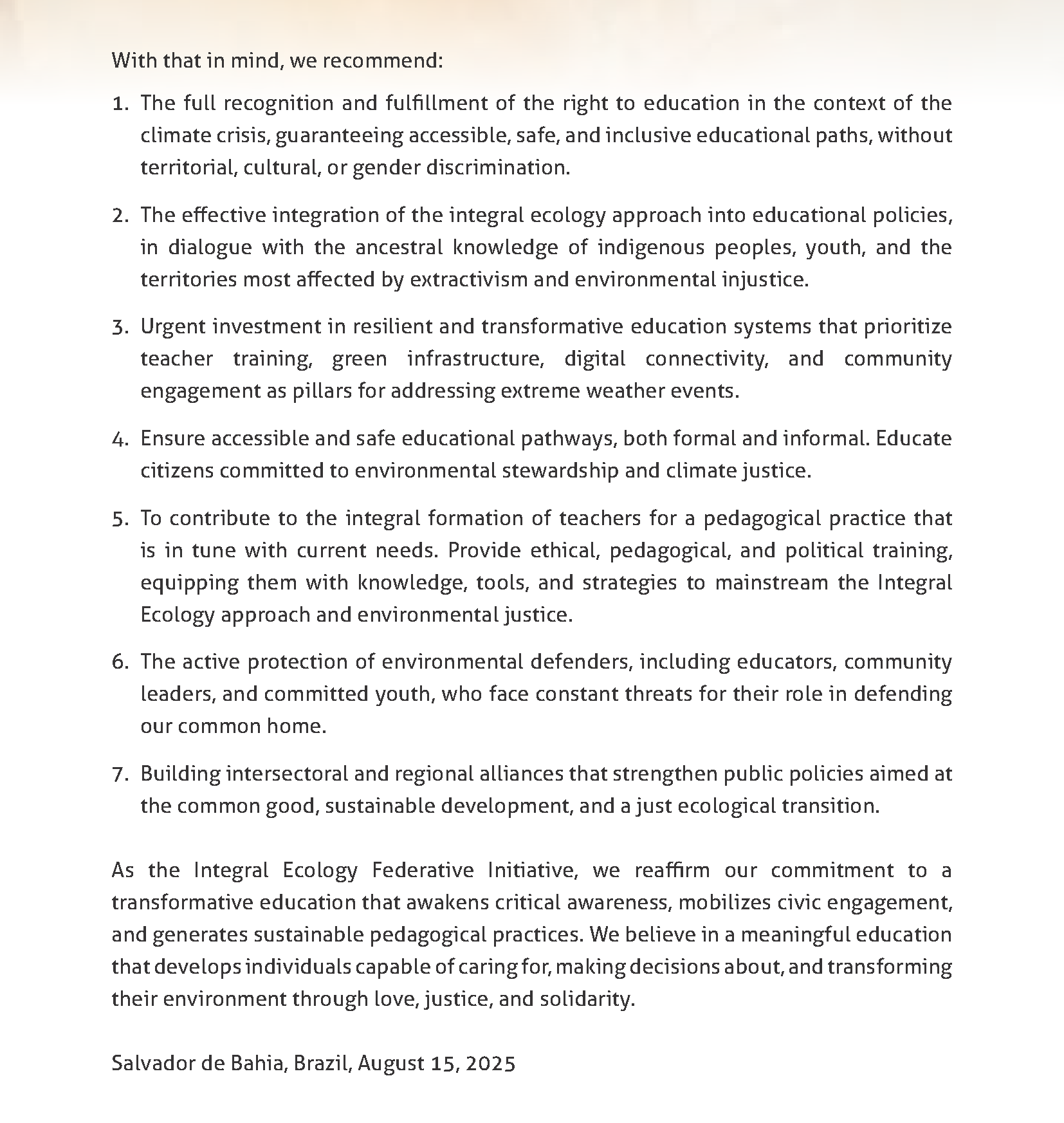This article was submitted by American Jesuits International, a GCE-US Coalition Member. Their strategic partnership with Fe y Alegría International serves as a bridge between the United States and Jesuit-supported education initiatives in Latin America, Asia, and Africa. Please learn more about their work here.
In just a few days, more than 60,000 participants will gather in Belém do Pará, Brazil, for COP30, the 30th United Nations Climate Change Conference (UNFCCC). World leaders from an estimated 200 countries, along with representatives from advocacy groups, faith communities, and grassroots movements, will meet to take a hard look at our global climate crisis and negotiate new commitments for the next decade. While most of the headlines will focus on carbon targets and financial commitments, Fe y Alegría, the Jesuit-sponsored popular education movement active in 22 countries, is bringing a different message to the global stage: the climate crisis is also a crisis for education.
When Classrooms Become Climate Casualties
Around the world, it is estimated that nearly a billion children live in countries at risk of climate-related disasters. In recent years, Fe y Alegría has witnessed the impact of climate related events in many of the 22 countries where they work. For example, in 2021, Hurricanes Eta and Iota damaged or destroyed nearly 1,000 schools in Honduras and Guatemala, and nearly 700 educational centers were used as shelters in the aftermath of the storms.
In its recent statement, “A Call to Put Education at the Center of the Global Climate Agenda,” Fe y Alegría warns that climate disruption is “widening the already alarming educational inequality gaps.” This warning is backed up by research regarding the impact of climate change. According to a report from UNICEF “at least 242 million students – from pre-primary to upper secondary education – have experienced school disruptions due to climate events in 2024.”
The crisis does not only threaten buildings or calendars; it threatens the right to learn itself. When students cannot attend school, when teachers are forced to adapt without training or resources, or when families lose their livelihoods, the opportunity for education is placed in grave danger.
Fe y Alegría’s Call to Put Education on the Agenda
Founded in 1955 in Caracas, Venezuela, Fe y Alegría is a movement of Popular Education and Social Promotion with centers in 22 countries in Latin America, Africa, and Europe. Through its Integral Ecology and Pan-Amazon Initiative, the movement has been reflecting on the impact environmental injustice has on education. They are also advocating for meaningful actions that will keep students in school and communities safe.
As part of their road to COP30, Fe y Alegría has made a deliberate effort to ensure that children and young people have a voice in this dialogue. In virtual meetings as well as in two in-person gatherings hosted in Basque Country, Spain, and Cartagena, Colombia, more than 150 young people discussed topics such as the climate crisis and its impact on society, current environmental challenges, the role of young people in political advocacy and in international spaces such as COP30.
This global conversation led by students came to one clear understanding: We must listen to the cry of the Earth and respond with determination.
Two young leaders, María Camila from Colombia and Beatriz from Brazil, will carry this message to COP30 and lift up the voices of so many Fe y Alegría students. Both young women have been active in local Fe y Alegría initiatives, promoting sustainable practices and civic engagement. “I am not coming to talk on behalf of the youth,” María Camila explains, “I am coming as part of the youth, as part of a generation that is already making new realities possible. Because we are not the future. We are the present that is organizing. That is troublesome. That is transforming and that is already making history.” Meanwhile, over the past year, more than 78,000 students from 11 countries in the movement took part in classroom discussions, workshops, and community projects on climate justice. Their reflections were compiled into a visual display and a digital campaign called “Voices of Fe y Alegría for Climate Justice.” Drawings, letters, and other materials from students have been shared on Fe y Alegría’s website and social media channels as well as being incorporated into the Jesuits' call to action ahead of COP30.
Meanwhile, over the past year, more than 78,000 students from 11 countries in the movement took part in classroom discussions, workshops, and community projects on climate justice. Their reflections were compiled into a visual display and a digital campaign called “Voices of Fe y Alegría for Climate Justice.” Drawings, letters, and other materials from students have been shared on Fe y Alegría’s website and social media channels as well as being incorporated into the Jesuits' call to action ahead of COP30.
Fe y Alegría’s Call to COP30
Fe y Alegría’s message to world leaders in Belém is clear: The Climate Crisis Is a Crisis for Education. In their Call to Put Education at the Center of the Global Climate Agenda, Fe y Alegría International has laid out seven clear recommendations for global leaders ahead of COP30:
Learning to Care for Our Common Home
As Fe y Alegría’s statement reminds us, “the future of the planet is also decided in the classrooms, on the playgrounds, and in the educational communities of the peripheries, where hope is sown day by day.”
By framing the climate emergency as an educational emergency, Fe y Alegría invites the world to rethink what climate justice really means. It is not only about protecting ecosystems but about ensuring that every child has the chance to learn, dream, and build a sustainable future.
As COP30 in Brazil approaches, Fe y Alegría’s delegation, alongside partners from other Jesuit networks, will continue to advocate for a global agenda that puts education at the center of our climate action.


